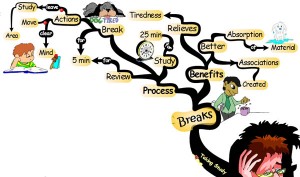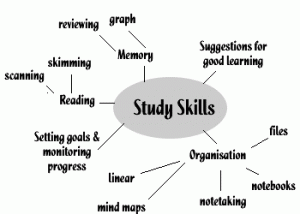
While interacting with many students across different schools, I have noticed that most of the students are really fighting with their study habits. It has been scientifically proved that your study habits, your posture while reading impacts your concentration and understanding capabilities. It is also evident that the routine followed by the students throughout the year is proportional to the final gradings.
No two students can have same grasping power and thus the different students have different levels of understanding of the same subject. The standard study habits of the students help them in getting higher grades. Different students have different learning capabilities and styles which help them in learning new subjects throughout their lives. These learning styles are broadly classified as below:
 Auditory learners: The students who understand the things better by hearing the details come under this category. They listen to the lectures and note down the details as per their understanding
Auditory learners: The students who understand the things better by hearing the details come under this category. They listen to the lectures and note down the details as per their understanding- Visual Learners: This category comprises the students who learn more while viewing the things. The different aids used in this technique of learning are pictures, images or prototypes.
- Tactile learners: This is the category of students where they like to do hands-on to understand the details. These students like to prepare their own models to understand the concepts.
The students are advised to first understand the mode by which they are most benefitted and then try to implement the same to have better learning. However this is not possible for every student to categorize himself in the above categories and hence it’s the responsibility of the parents to identify the strengths of their children and help them in growing in the most comfortable fashion.
Apart from these learning categories, there are different modes of studying which students follow and some of those best strategies are discussed below:
 Time Management: Being in class or at home every student is asked to prepare a timetable. All the schools have their own timetables which help them in covering maximum subjects in the limited times, but most of the times the students fail to manage the timetable at home. Studying is not only about completing your homework. It’s about how you learn different things utilizing the available hours in a day. The tips for time-management are as below:
Time Management: Being in class or at home every student is asked to prepare a timetable. All the schools have their own timetables which help them in covering maximum subjects in the limited times, but most of the times the students fail to manage the timetable at home. Studying is not only about completing your homework. It’s about how you learn different things utilizing the available hours in a day. The tips for time-management are as below:
- Prepare short timetables.
- Decide the time to devote to studying daily.
- Don’t take breaks quickly instead take quick breaks.
- Avoid late night study and better to start your day early.
- Take Notes: Be in your class or studying at home, taking notes is the most reliable way of learning. It helps in your exam preparation and quick revision. Note down the bullet points instead of noting full story and understand the concept to articulate the details in your language. The tips for taking notes are as below:
- Jot down the bullet points
- Use the technical terms while taking notes
- Be precise while taking notes in the class and try to write the important points instead of a complete story
- Rewrite the details at home with the description in your own language but don’t forget to introduce the technical terms wherever necessary
- Mind your posture: Many students like to read the books in the most comfortable possible way and sometimes they like to sit on the lounges or sofas in front of Television sets while studying. This is the incorrect way of reading and all the students should avoid it. They are advised to use table and chair sit straight with both the hands on the table while studying. Keep your back as straight as possible and avoid resting your chin with your palm while reading.
 Quiet study room: Try to make your study area as calm and quiet as possible. The students are advised to avoid studying in the TV rooms or the drawing rooms if the family expects frequent visitors. A room with proper lights and ventilation is always helpful in increasing the interest in studying. A light music is helpful in increasing the concentration but that too for shorter duration. The other tips on study area are as below:
Quiet study room: Try to make your study area as calm and quiet as possible. The students are advised to avoid studying in the TV rooms or the drawing rooms if the family expects frequent visitors. A room with proper lights and ventilation is always helpful in increasing the interest in studying. A light music is helpful in increasing the concentration but that too for shorter duration. The other tips on study area are as below:
- Avoid Television sets or Playstations from the study area
- The parents should visit the study area regularly and keep an eye on the items used for decorating the area
- Avoid frequent visitors in the study area
- Ask Questions: “No question is silly till it answered”, remember this fact and don’t feel shy in asking any question related to the topic of discussion.
 However during general discussions the students are advised to frame questions on different topics and discuss it with the teachers and the parents. Asking questions always helps in clearing the doubts and in turn increasing the learning of the students. The questions or queries can also be discussed in group study. Group study with certain limitations is a better option to learn and understand the details
However during general discussions the students are advised to frame questions on different topics and discuss it with the teachers and the parents. Asking questions always helps in clearing the doubts and in turn increasing the learning of the students. The questions or queries can also be discussed in group study. Group study with certain limitations is a better option to learn and understand the details - Revise Regularly: Revision is the best way to keep you updated with your learnings throughout the year. Once you take down the notes, prepare your study materials don’t put them into your cupboard instead revise it regularly. Make a habit of revising different subjects weekly depending on your capability and bandwidth.
 Plan-Do-Check-Act (PDCA): PDCA cycle is mostly used in the software industry but it can be adapted by the students in enhancing their study habits. The tips on using the PDCA cycle are as below:
Plan-Do-Check-Act (PDCA): PDCA cycle is mostly used in the software industry but it can be adapted by the students in enhancing their study habits. The tips on using the PDCA cycle are as below:
- Plan: make your objectives and schedules clear and plan accordingly. Plan for a week and try to study as per the schedule.
- Do: Once you have scheduled your week try to study as per your planning. Avoid the distractions as much as possible. Avoid long breaks and unwanted discussions. Manage your other activities as per your study schedule and fill the breaks with some physical activities or with your hobbies.
- Check: Once you are done with your weekly plan, evaluate the results. Think about the gaps and distractions during your weekly schedule and plan the next week keeping in mind the details of the last week.
- Act: Compare the results. Use your evaluation capability to compare the differences between the planned schedule and the schedule you followed. Try to fill the gaps, if any and stick to the plan if you are on the right track. Remember to plan the week as per your strength and don’t over or underestimate yourself.
 Maintain your health: Great minds reside in healthy bodies. Your learning capability depends on how healthy you are. The healthy body doesn’t resemble only the physically fit body but a person is healthy if his immunity power is higher. The tips to maintain your help are:
Maintain your health: Great minds reside in healthy bodies. Your learning capability depends on how healthy you are. The healthy body doesn’t resemble only the physically fit body but a person is healthy if his immunity power is higher. The tips to maintain your help are:
- Eat good food, preferably home-made. Avoid junk foods as much as possible.
- Take sound sleep, preferably 8 hours (10pm to 6am)
- Avoid late night sleep or late night study
- Exercise regularly, a mild exercise, brisk walking or jogging, yoga etc. helps in increasing the concentrations. Growing students are not allowed to do heavy exercises and without guidance
So far we have learnt different techniques which can help the students in developing good study habits. Follow the same and see the difference.
Happy Learning!!

This article was very helpful. Thank you!
Hi Vaibhavi, I’m so glad that it was of help to you.If you have any queries you can post them and I will get back to you.
This was just what I was looking for. Thank you!
Hi Ishvar,
So glad I could help. If you have any queries you can post them and I will get back to you.
Very Informative article, Interested to read more on such topics.
Hi Pooja,
Glad to know that the article was informative then our section on Study & Exam Tips will be of interest to you.